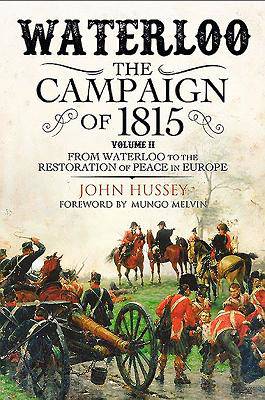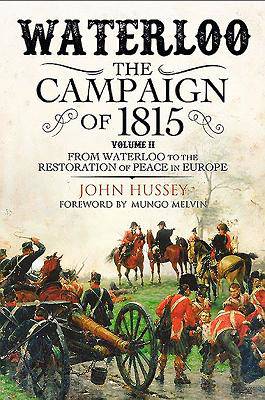
Bedankt voor het vertrouwen het afgelopen jaar! Om jou te bedanken bieden we GRATIS verzending (in België) aan op alles gedurende de hele maand januari.
- Afhalen na 1 uur in een winkel met voorraad
- In januari gratis thuislevering in België
- Ruim aanbod met 7 miljoen producten
Bedankt voor het vertrouwen het afgelopen jaar! Om jou te bedanken bieden we GRATIS verzending (in België) aan op alles gedurende de hele maand januari.
- Afhalen na 1 uur in een winkel met voorraad
- In januari gratis thuislevering in België
- Ruim aanbod met 7 miljoen producten
Zoeken
Waterloo: The Campaign of 1815
Volume II - From Waterloo to the Restoration of Peace in Europe
John Hussey
Paperback | Engels
€ 48,45
+ 96 punten
Uitvoering
Omschrijving
Winner of the 2019 RUSI Duke of Wellington Medal for Military History
Winner of the 2017 Society for Army Historical Research Templer Medal
The concluding volume of this work provides a fresh description of the climatic battle of Waterloo placed in the context of the whole campaign. It discusses several vexed questions: Blücher's intentions for the battle, Wellington's choice of site, his reasons for placing substantial forces at Hal, the placement of Napoleon's artillery, who authorized the French cavalry attacks, Grouchy's role on 18 and 19 June, Napoleon's own statements on the Garde's formation in the final attack, and the climactic moment when the Prussians reached Wellington's troops near la Belle Alliance.
Close attention is paid to the negotiations that led to the capitulation of Paris, and subsequent French claims. The allegations of Las Cases and later historians that Napoleon's surrender to Captain Maitland of the Bellerophon amounted to entrapment are also examined.
After a survey of the peace settlement of 1815, the book concludes with a masterly chapter reviewing the whole story of the 1815 campaign.
Winner of the 2017 Society for Army Historical Research Templer Medal
The concluding volume of this work provides a fresh description of the climatic battle of Waterloo placed in the context of the whole campaign. It discusses several vexed questions: Blücher's intentions for the battle, Wellington's choice of site, his reasons for placing substantial forces at Hal, the placement of Napoleon's artillery, who authorized the French cavalry attacks, Grouchy's role on 18 and 19 June, Napoleon's own statements on the Garde's formation in the final attack, and the climactic moment when the Prussians reached Wellington's troops near la Belle Alliance.
Close attention is paid to the negotiations that led to the capitulation of Paris, and subsequent French claims. The allegations of Las Cases and later historians that Napoleon's surrender to Captain Maitland of the Bellerophon amounted to entrapment are also examined.
After a survey of the peace settlement of 1815, the book concludes with a masterly chapter reviewing the whole story of the 1815 campaign.
Specificaties
Betrokkenen
- Auteur(s):
- Uitgeverij:
Inhoud
- Aantal bladzijden:
- 616
- Taal:
- Engels
Eigenschappen
- Productcode (EAN):
- 9781784385385
- Verschijningsdatum:
- 27/12/2019
- Uitvoering:
- Paperback
- Formaat:
- Trade paperback (VS)
- Afmetingen:
- 155 mm x 231 mm
- Gewicht:
- 952 g

Alleen bij Standaard Boekhandel
+ 96 punten op je klantenkaart van Standaard Boekhandel
Beoordelingen
We publiceren alleen reviews die voldoen aan de voorwaarden voor reviews. Bekijk onze voorwaarden voor reviews.









